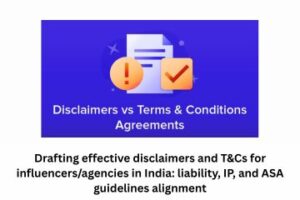Mistake under the Indian Contract Act 1872
Q. What are the different types of mistakes? Explain their effects on the validity of the contract.
There can be two types of mistakes – a mistake that misleads the parties to an agreement to consent and a mistake that defeats the consent itself.
For example, A contracts with B for purchasing goods coming by ship. However, unknown to both, the ship has already drowned at the time of the contract. In this case, there was a mistake of a fact, which lead the parties to consent. This type of mistake is covered by sections 20, 21, and 22.
In another example, A enters into a agreement with B thinking that he is C. In this case, there was no consent from A at all because of mistake in identities. As another example, A agrees to sell to B his stock and B agrees to pay 5000Rs for A’s stock. However, A was thinking about his livestock (i.e. cattle) and B was thinking about shares of a corporation. In this case, there was no consent because they agreed on the same thing but not in in the same sense. These mistakes defeat the consent itself. There is no real consent here at all. This type of mistakes is covered by section 13, which says that when two persons agree to the same thing in the same sense, they are said to consent. Agreement on the same thing in the same sense is true consent and is called consensus ad idem. If there is no consensus ad idem, there is no agreement, and hence no contract.
Section 20 says that an agreement is void when both the parties are under mistake as to matter of fact that is essential to the contract.
Illustrations
A agrees to buy a horse from B. At the time of agreement the horse was dead but no one knew about it. The agreement is void.
A, being entitled an estate for the life of B, sells it to C. B was dead at the time of contract but both the parties were ignorant of the fact. The agreement is void.
Section 21 says that a contract is not voidable if it was caused by mistake as to law in India. However, mistake as to law outside India has the same effect as mistake of fact.
Section 22 says that contract is not voidable merely because one of the parties was under mistake as to fact.
Thus, for an agreement to be voidable due to a mistakes three conditions are required –
- Both the parties are under mistake.
- Mistake is of a fact.
- fact is essential to the agreement.
Which facts are essential to the agreement?
This depends on the nature of the promise in each case. Something that is remotely linked to the agreement is not an essential fact. For example, A agrees to hire B for taking his goods to a city. They came to know later that there is no electricity. This fact is not essential to the contract. However, it they come to know later that all transporters are on strike, this would be a fact essential to the agreement.
There are three types of things that are essential facts to an agreement – identity of the parties, identity and nature of the subject matter of the contract, and nature and content of the promise itself.
Mistake as to identity
Mistake as to identity can occur due to
- assumption of a false name
- taking over a business
- fraud
In the case of Cundy vs Lindsay 1878, a fraudster, who had a similar name as that of the defendant, sent an order to the plaintiff . Plaintiff supplied the order which went to the defendant. It was held that since there was a mistake as to identity, there was no contract between the parties.
In cases where identity of the offeree is important to the offerer, a contract cannot arise in the case of mistake as to identity. In the case of Said vs Butt 1920, the plaintiff got the tickets for a show through a friend but the defendant, the manager of the theater did not allow him to enter. It was held that since the manager did not give the ticket for the plaintiff, there was no contract between them.
Mistake as to Subject matter
This can occur due to
- Non existent subject matter
- Mistake as to title or ownership
- Different subject matters in mind
- Mistake as to quality of subject matter.
Raffles vs Witchlehaus -Parties had different ships in mind but both were named peerless. It was held that there was no consensus ad idem and so the contract must be set aside.
Smith vs Huges – Buyer wanted to buy old oats for his horse. The seller showed him the sample but didn’t say anything about the age. The buyer kept the sample for 24 hrs and then ordered. Later on he rejected the order saying that the oats were new. It was held that buyer had no right to reject.
Mistake as to the nature of promise
When a deed of one character is signed under the belief that it is of another character, the agreement is wholly void.
Sarat Chandra vs Kanailal – A gift deed was signed under the impression that it is only power of attorney. It was held void.
Limitations
Both Parties
According to Section 20 both the parties must be under a mistake for the agreement to be void. This is further supplanted by article 22 that an agreement is not void if only one party is under mistake.
Erroneous Opinion
Explanation to section 20 says that an erroneous opinion regarding the subject matter does not render an agreement void. This was reflected in the case of Smith vs Huges.
Mistake of fact and not of law
Section 2 1 says that mistake of law does not render an agreement void. Thus, the mistake must be of a fact. A mistake of foreign law will be treated as a mistake of fact.
Keywords: Mistake in India, Concept of Mistake, Definition of Mistake under Indian Contract Act 1872
Click here to read the Indian Contract Act 1872
Section 28 Contract Act – Clause Barring Payment Of Interest Not Hit: Supreme Court




